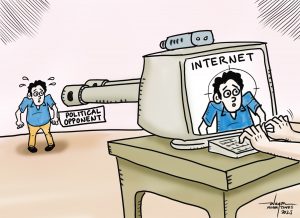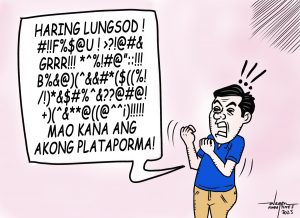In all my years in Philippine politics — in the executive and legislative branches, in the national and local levels — I found out the hard way that power is mostly carried out through threats and coercion. And that is why being powerful is perceived as also being violent.
The so-called “strongmen” are admired (while “strong women” are just considered crazy bitches, but that is another topic). Those leaders capable of brute force to bring order and push their brand of dictator-ish governance are seen as brave and strong. Just what a community of undisciplined and unruly citizens needs. The antidote to chaos.
Our image of a strong Philippine politician is one who owns a gun (or many) and is not afraid to use it. The more armed guards an official has, the more powerful that person is perceived to be.
I guess when you have guns and backed by an army, it is easier for you to talk tough (or trash-talk) and not care about what comes out of your mouth and who gets hurt. That is probably how black propaganda and fake news became lucrative enterprises — to cater to these politicians.
For someone who thinks of herself as a nonviolent person (my body shakes and I get literally sick when I hear angry voices and loud banging noises and see any kind of pain and suffering), you can just imagine my struggle working in a violent environment that is politics. I got sick at least once a month and hospitalized every six months. But the doctors could not find anything medically wrong with me. The consistent diagnosis was “chronic stress” and the prescription was “change occupation.”
If it was such a struggle, why did I stay all those decades? Because ever since I was a little girl, I always wanted to change the world and bring world peace. I naively believed I could do that while in government.
Based on what society told me while growing up, there are two ways a girl can do that. One, become a beauty queen (and pursue a career in entertainment and become a beauty-with-a-purpose influencer). Two, become a President of the world (or be whoever makes the big decisions in the world, which means work in politics).
The beauty queen option is not for me because I find it ridiculous to have a contest based on physical attributes you had nothing do with (born this way and all that). If you believe we are all created by God and everything that God creates is beautiful, then shouldn’t God get the credit for all beauty contests? I am probably just rationalizing because I can’t sashay in high heels while wearing a swimsuit on stage or elsewhere. If the entire pageant is about the question and answer portion then I would probably have a chance as a beauty queen.
Since answering questions and finding solutions turned out to be my talent, I ended up in politics.
As a young woman in politics, I quickly realized how little power I had to change the world and bring about world peace. A significant portion of my time and energy was spent in bureaucratic paperwork, signing stuff, putting out fires, defending my boss and myself from backstabbers and saboteurs, doing damage control, and making compromises.
The truth is when you are in what they romantically call the “halls of power” or even the “seat of power,” you would hardly feel any power at all. The feeling would be closer to that of a hostage situation. Like that traditional Filipino game of “Agawan Base” (Taking Bases) because all you seem to do is protect your base from being taken away from you.
How can you change anything when the whole system is set up like “Agawan Base”? Why do you think the hashtags are “Protect PBBM” or “Protect PRRD”? It’s a game of defense. And you cannot build a nation when you are perpetually on a defensive mode.
This brings to mind that Buckminster Fuller quote: “You never change things by fighting the existing reality. To change something, build a new model that makes the existing model obsolete.”
Like what Mahatma Gandhi did in India. He initiated projects that enabled Indians to take charge of their own society, making it much easier to break their dependency on their British colonizers. Because you cannot get rid of oppressors when you depend on them for goods and services. You cannot just forever react to those who offend you. You need to be proactive.
My A-ha! moment came later in my political life, when I started to embrace feminist principles and practice. I realize that women are marginalized in politics and in most decision-making processes because our idea of power is using fear and control to get what you want, whatever that may be. Because power has been defined by the patriarchy so it is male-dominated, male-controlled, and male-centered.
Of course, women cannot relate when they are not part of the narrative. If being a powerful politician means using violent ways to get things done, most women would think it is not a worthwhile pursuit. Women — who carry and nourish humans inside their bodies and give birth to them at the risk of their own lives — think being destructive and harmful would be counterintuitive and counterproductive.
I am not saying there are no violent women because there are. Because violence is learned. But as author and psychology professor Steven Pinker famously declared: “Violence is a guy thing.” Under a patriarchal society, men are socialized to be dominant and they enforce their dominance through the use of violence. Not blaming men, but the patriarchal system.
If I want to change the world and help bring world peace, I need to redefine what power means that is nonviolent and relatable to women. And I like how #WomenSeriously lead convener, Irene M. Santiago, defines it: “Power is the capacity to act for what is good.”
If you use your influence and capacity to act for what is not good (or for bad), you are not powerful. You are just doing evil things. True power is always used for good.
Violence may be perceived to work sometimes when it forces a particular change swiftly. And the person using it may be seen as “powerful” for making it happen fast. But in the long run, that change is not sustainable.
As Dr. Martin Luther King, Jr. said: “The ultimate weakness of violence is that it is a descending spiral, begetting the very thing it seeks to destroy…Returning violence for violence multiplies violence, adding deeper darkness to a night already devoid of stars. Darkness cannot drive out darkness; only light can do that. Hate cannot drive out hate; only love can do that.”
The truly powerful — the kind that changes the world and promotes world peace — subscribe to nonviolence principles and practice. Nonviolence is for courageous people. Because love is only for the brave.


